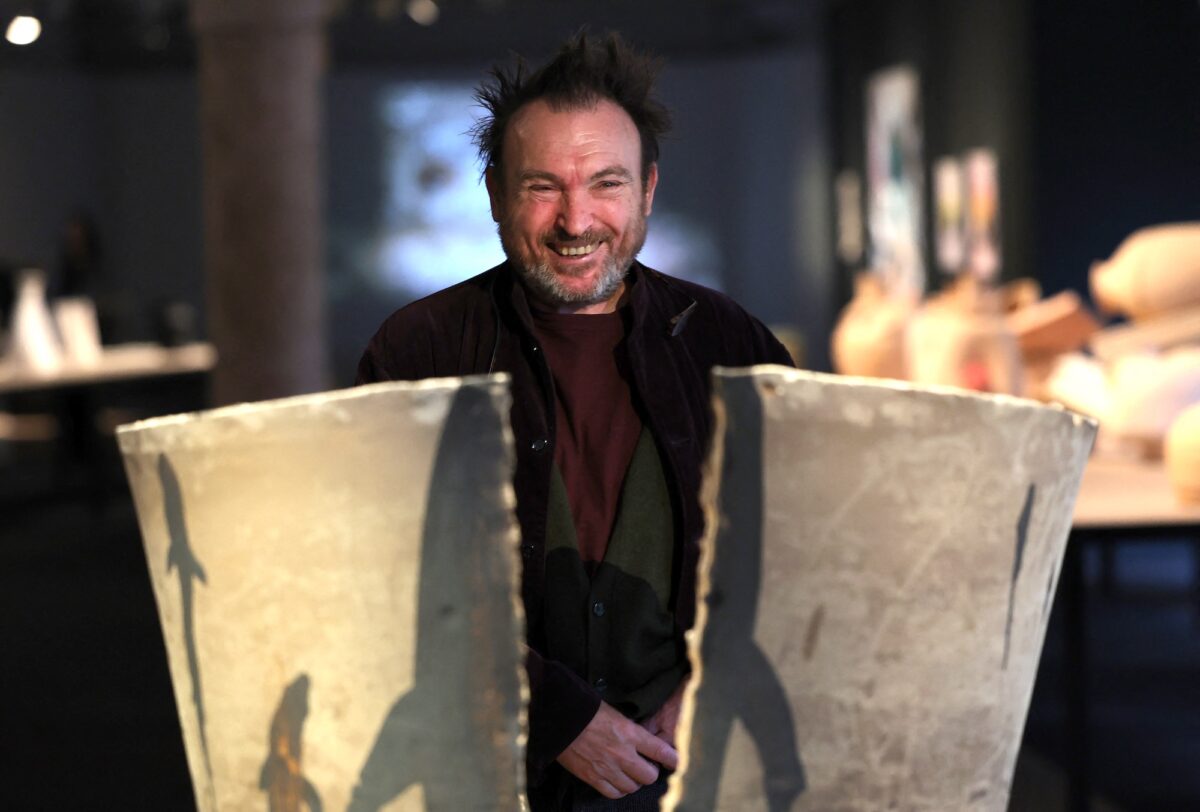
BERMUDEZ
In the Buencamino household in Quezon City, talk about rehearsals and tapings and pictorials is part of the script of everyday life. After all, this is home to three dogs, four youngsters—and their parents.
Actors Nonie Buencamino and Shamaine Centenera-Buencamino have been stalwarts of Philippine theater for the last two decades, and have thankfully also been giving television and film a much-welcome shot of excellence with their work in the last few years.
Nonie, 46, an acclaimed tri-media actor with a gift for playing nonstereotypical villains, has done everything from Shakespeare and ballet (he once took a five-month crash course for Agnes Locsin’s “La Revolucion Filipina” for Ballet Philippines, just so he could walk like a dancer) to Broadway, and is, in fact, poised to take over as the headstrong ruler of Siam in “The King and I” at Resorts World Manila in January 2013.
The latest of the many accolades thrown his way: A Star Awards trophy for his TV performance in an episode of “Maalala Mo Kaya” in 2012.
Shamaine, 47, went swiftly from theater arts scholar at the University of the Philippines (UP) to a gallery of stage roles that would make lesser actresses weep—think Helena in “A Midsummer Night’s Dream,” Jocasta in “Oedipus Rex,” a heartbreaking Atang de la Rama in Floy Quintos’ “Atang,” or an acclaimed turn as Josephine Bracken in Layeta Bucoy’s “Tu Dulce Estranjera,” which she performed in Dublin, Ireland.
A “full-time actress” only in the last four years, Shamaine joined Nonie most recently in the cast of the hugely successful soap opera “Walang Hanggan.”
Then, without missing a beat, they were the tap-dancing, hard-loving couple Tirso and Ester in the late Mario O’Hara’s final oeuvre, the dizzying, delightful tribute to a marginalized art form, “Stageshow,” shown during the recent National Theater Festival at the Cultural Center of the Philippines (CCP), and which will have another run in August next year.
She’s already taping for her next TV soap in January, and is set to step onstage next in the Philippine Educational Theater Association’s adaptation of Shakespeare’s “Twelfth Night” by Rody Vera.
And then there’s Sarah Delphine, 21, eldest among the resident youngsters (followed by 19-year-old computer engineering student Gregorio Martin and high schoolers Jose Antonio, 15, and Julia Louise, 12).
Just when you thought there was enough acting chops to go around, the Ateneo Humanities graduate added to the trove by playing the feisty female lead in Dulaang UP’s “Orosman at Zafira,” also presented at the National Theater Festival, and is now choreographing “Spring Awakening” for Ateneo’s Blue Rep in February.
Lifestyle recently visited with the “royals”; here are excerpts from the conversation.
So what was it like, doing “Stageshow”?
Nonie: Sometimes confusing, because of the form; it was very segmented, so finding the true line was challenging. (Director) Chris Millado knew where it was going, but it was still difficult to make it streamlined.
Shamaine: The hardest part was being able to make it on cue, because there were so many changes! It was like a marathon!
Nonie: You needed a lot of stamina. In tap dancing, it’s the movement of the feet.

Shamaine: Both of our knees still hurt—until now, ha!
But you’ve done a lot of song-and-dance before.
Nonie: Yes.
Shamaine: Pag pinipilit lang. (Laughs) I would like to.
Nonie: No, she can. It’s just that she did not do it often, because she did a lot of straight plays.
It’s not the first time you’ve worked together, either, is it?
Shamaine: No, but it’s been 12 years since we last worked together, in “Oedipus Rex” in UP Los Baños. It took some getting used to again, because we’re very particular about our choices when we act, and there was even one rehearsal when I was telling him what to do! (Laughs) He said, “Can’t you just do it? Will you stop directing yourself?” That stopped rehearsals for a while!
Nonie: We discuss things a lot, but we found it’s better not to (laughs). I guess it’s part of our maturity. You really have to stop thinking that that’s your wife or husband, because the tendency is to feel safer, like you can say anything and ask anything of that person. But you have to treat each other as professionals.
Like, what acting quirks do you point out?
Nonie: I’m the more forgetful one, so sinasabihan niya ako.
Shamaine: Like, “You’re supposed to be here …”
Nonie: I just tell her not to point it out when the moment is there already. Naiiyak ka na, inuurong ka pa (laughs)! She’s the perfectionist.
Do you remember when you first watched Delphine on stage?
Shamaine: Yes! We held a summer workshop in Los Baños, where we were living for a while, and she was in Grade 6. We directed a play about animals, and she was part of the cast.
Nonie: We watched her and said, “Meron!” (laughs)
Shamaine: Sabi namin, Diyos ko, heto na, enjoy na enjoy! But I was just happy that she was also so happy doing it, that she shared our joy. She was graduating then, and we had the choice of sending her to the Philippine High School for the Arts (PHSA), which she passed, or the UP rural high school, which was geared more towards science. She was the one who chose.
Delphine, when did you first realize that you wanted to act, too?
Delphine: When I went to PHSA. When I went to Ateneo, they actually told me not to take theater arts, but a different course.
Shamaine: To supplement what she was learning. I was a theater arts major in UP, and a lot of the subjects I took, I had already taken in PHSA. You learned more from doing plays. I actually encouraged her to take creative writing. I felt it would enable her to do anything.
So Nonie and Shamaine, do you consider yourselves tri-media actors? Or is there still a bias for theater?
Shamaine: I still love theater more. If I had a choice, and if it paid as well as film and TV, I would just do theater, even if in film, you’re immortalized. But the thrill and fulfillment are different.

Nonie: The tri-media idea is a good thing, though, because I also want to be challenged by the medium. It excites me to come up with a decent performance, and to be able to adjust.
Shamaine: We’re really passionate about the craft, still. It’s really different. When we were rehearsing for “Stageshow,” nauuna kami parati dumating. But the challenge of other mediums is also good, as each day is different. I have to remind myself about the camera. I feel I haven’t really mastered it, and I forget.
So is it still true that theater people get more respect, but are not paid well— you’re good but cheap?
Shamaine: Theater people are already demanding. And individually, more aware that we were really branded “cheap” before.
Nonie: There’s already a Theater Actors Guild, so we’re paid a little better. Also, there’s acknowledging the importance of having an agent, having someone to talk for you. Ako, matagal na meron, but Shamaine only got an agent two or three years ago.
Shamaine: Recent lang yung full-time acting career ko; before that I was doing assistant director work. When we moved back to Manila, Delphine actually told me, you can just give me a pair of socks for Christmas, as long as you can act, because she knew that made me happy.
So that love for theater has rubbed off on you, Delphine?
Delphine: Yes. They warned me so many times that it’s not going to be a stable track. But at the same time, they were very supportive and pushed me to train, to take formal classes in voice, dance, and acting. That’s something my peers don’t have, so I’m lucky. I have parents who know the value of training. Dance training, for example, which I started in high school—it was my dad who told me to do it. I was a chubby, roly-poly girl, so I said, why? But I did it.
So what are Delphine’s strengths as a performer?
Nonie: When we did that animal play for their workshop when she was Grade 6, she was the only one we felt was really enjoying herself and getting lost in it. She played a tiger, and she really believed in what she was doing.
Shamaine: She was creating a character that early. Now, she moves like an actress, even when she’s dancing. That makes her very different. She has character when she moves. I don’t know if it’s because we’re her parents, but our eyes are always on her. (Laughs)
Nonie: She’s the only one there! (Laughs) It’s the carriage and the presence. And the singing, like the dancing, has a lot of acting in it.
Shamaine: Nonie and I have discussed this. When she approaches a character, she’s not the stereotypical, soft ingénue, like when she did Juli in “Fili.” I don’t know if it’s because of her personality, but the characters she creates are defiant.
Nonie: She’d make a good Antigone, I think.
Delphine: Akala ko Zena, warrior princess (laughs)! We actually did Antigone as our high school production, but since we didn’t have enough boys, I ended up playing King Creon!
And why are your parents such good actors?
Delphine: Mom is a perfectionist. For both of them, walang short-cut. I see them at home doing homework—research, studying. It’s not magic. But the biggest difference is that my mom is more word-perfect, verbatim, precise—but you wouldn’t know, because every performance is fresh.
Meanwhile, my dad is more instinctive; he does the homework, but he allows the performance to fly when he gets there. I forget that they’re my parents sometimes when I watch them, which I think is their biggest accomplishment.
I think my dad sings well. He plays good leaders, because he has good command over other people. Even as a teacher, wala siyang ginagawa, but you will listen. I see Mom do drama more, but when she does comedy, like in “Kalungkutan ng Reyna” (by Floy Quintos), puede pala siyang komedyante!
Do they teach you about work ethics, and not letting this get to your head?
Shamaine: Only when she asks.
Delphine: I think that’s by example. Aside from the general etiquette of rehearsing, it’s the respect towards your co-actors, and never being complacent. Since theater is live, you should always look for something new to do.
Nonie: Do not believe in your own publicity!
Shamaine: From experience, you know you’re only as good as the last project. It’s when you believe yourself so much that you fail. There was this article that talked about how we were “royalty,” and should be treated as such. I was asking Nonie about that, because we were really disappointed and sad with the audience turnout for “Stageshow.” I would have thought, since we had a popular TV show, they could have been selling us more. That was during “Walang Hanggan,” which was a record-breaking soap. Maybe there was no time and no marketing budget. So no, we’re not royalty. (Laughs) Theater sort of teaches you that—nobody’s really indispensable.
So how do you work with incompetence? Awful co-actors?
Nonie: I ask them to throw lines, when I feel tinatamad-tamad or kulang. Then, “Puede bang sabihin mo ganon?” They listen, kasi may edad na ako (laughs).
Shamaine: I have yet to learn that, because I come home and complain! Because if it’s a very emotional scene, and they buckle, or forget …
Delphine: One thing my dad told me was, be careful not to end up criticizing your co-actor while you’re in the scene. Focus on what you’re doing, so you don’t get lost, and don’t become an acting critic.
Nonie: Suspension of disbelief. Your imagination has to be stretched so you can take whatever he gives, and still do it.
Can you see yourself doing this long-term, Delphine?
Delphine: Yes.
Nonie: We do warn her there will be a lot of heartache, disappointments, failures you must take in stride. Like if you want a project, but you don’t get it because you’re not a celeb or didn’t make the audition—you just have to keep doing your best. The only thing you can control is yourself, so you make yourself better from day to day and be ready when the opportunity comes.
Shamaine: Or when you have to pay the rent, the bills, and the acting projects are not paying enough. Dapat kaya ng ego mo when you do other work.
Do you have to deal with having them as parents?
Delphine: All the time. (Laughs) It’s a good kind of pressure sometimes. I’ve never walked into an audition where the panel didn’t know my parents, but I don’t let it get to me. In theater, when you start rehearsing and doing shows, pantay-pantay na. It’s more of a courtesy thing, when they ask me to say hi to my folks. But I don’t know if they have expectations, because they never say.
Auditioning is good, because it keeps you on your toes and makes you feel you’re on the same page as every other actor. Whether you’re the chorus or the lead, you give the same kind of work to every role, because theater will always be ensemble work. When I don’t pass an audition—eh di, hindi para sa akin. I get disappointed, but I move on quickly, because marami pa.
So how much do your parents love what they do, you think?
Delphine: It can’t be quantified. If there was a list, family and craft would be almost on the same level. Craft for them is self-actualization—it defines them.
People say they are royalty, or pillars of Philippine theater, but you know what? That’s not completely untrue.













































